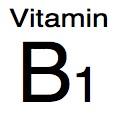Vitamin B1 - Uses, Benefits, Sources and Dosage
 Vitamin B1 (thiamine) is named as "thio-vitamine". It is a vitamin of the B-complex Vitamin and is water soluble and is one of the essential nutrient for the human body. It is named as vitamin B1 because it was the first B vitamin discovered. It is needed by our bodies in order to use carbohydrates properly.
Vitamin B1 (thiamine) is named as "thio-vitamine". It is a vitamin of the B-complex Vitamin and is water soluble and is one of the essential nutrient for the human body. It is named as vitamin B1 because it was the first B vitamin discovered. It is needed by our bodies in order to use carbohydrates properly.
Benefits of Vitamin B1
Vitamin B1 acts as a coenzyme, and activates the enzymes and proteins which is essential for various biochemical processes that are taking place in our body. This is the main benefit of this vitamin.
Other Benefits of vitamin b1
- It is helpful in treating people who have heart disease, metabolic disorder, cataracts, canker sores, aging and motion sickness.
- It helps in the maintenance of healthy immune system.
- It helps in the healthy functioning of heart.
- It is required for the normal functions of nervous system. It plays important role in the conduction of nerve impulse.
- It is required for the production of energy from the food.
- It is essential for the synthesis of nucleic acid (DNA).
- It is used to treat digestive problems like poor appetite, ulcerative colitis and diarrhea.
- As an antioxidant, it can be used to prevent arthritis and atherosclerosis.
Sources of Vitamin B1
The best source of vitamin B1 is dried brewer's yeast. The other sources of vitamin A includes dried milk, nuts, oats, eggs, legumes, peas, onion, carrots, cabbage, spinach, potatoes, oranges, beef, liver and pork etc. Some foods like rice, breads, cereals, pasta and flour are often fortified with thiamine. Seeds sunflower seeds and flax seeds are very good source of thiamine. Processed foods are the main reason for the deficiency of this vitamin. Deficiency of this vitamin leads to difficulty in the digestion of carbohydrates, difficulty in breathing and may lead to heart damage and may even cause loss of mental alertness. Disease that are caused by the deficiency of this vitamin includes beriberi, Alzheimer's disease, alcoholism and congestive heart failure etc.
Dose of Vitamin B1
For males who are 14 years old and above are required to consume 1.2 mg per day while for the females of 14 years old to 18 years old, the recommended daily allowance is 1 mg per day. The females of above 18 years old are required to take 1.1 mg per day. The pregnant and the breastfeeding women may need little more dose of Vitamin B1.
In general the deficiency of vitamin B1 is rare but it can occur in some people who get most of their calories from the sugar or alcohol. Elder people are at increased risk of vitamin B1 deficiency. It is generally nontoxic. But very high dose of vitamin B1 can cause stomach upset. We should avoid overconsumption of Foods like alcohol, coffee, tea, and raw fish because vitamin B1 is destroyed by these foods. It is often used with other B vitamins in vitamin b supplements for people who are deficient in vitamin B1.

